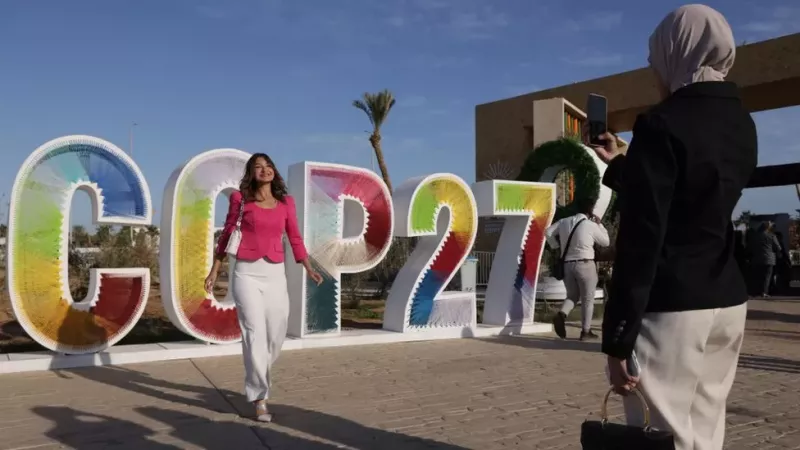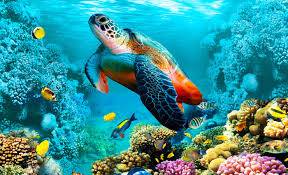As Egypt hosts world leaders at COP27 to discuss action over climate change, an oil terminal is dumping toxic wastewater on the country's Red Sea coast, an investigation by BBC News Arabic has found. A rare form of coral, that offers hope for preserving ocean life as the planet warms, could be a casualty. Leaked documents obtained by the BBC and non-profit journalism group SourceMaterial reveal that "produced water" from Egypt's Ras Shukeir oil terminal is being dumped into the Red Sea every day.
Read Also:
The barely treated wastewater - which is brought to the surface during oil and gas drilling - contains high levels of toxins, oil, and grease. The documents, which were issued by the Gulf of Suez Petroleum Company (Gupco) in 2019 to try to hire a company to treat the water, say the pollution levels "do not comply" with Egyptian environmental laws and regulations. Every day, 40,000 cubic meters of this toxic water - the equivalent of 16 Olympic-sized swimming pools - is going into the Red Sea, the documents say. Dr Greg Asner, an ecologist at Arizona State University, says the information is "very alarming", showing pollution from lead, cadmium, copper, nickel, and other heavy metals. "You don't have to be an expert to know that something is not right here," he says.
The leaked documents indicate Egypt's government has known about the wastewater problem since at least 2019, after British oil company, BP sold its 50% stake in the plant to United Arab Emirates firm, Dragon Oil. The other 50% is owned by Egypt's state oil company. The sale by BP was part of a decision to dispose of company assets worth $10bn (£8bn at the time), seen by many commentators as a plan to help it meet climate targets. Caroline Lucas, a UK MP for the Green Party, says: "It comes as no surprise that BP and others would rather sell on their dirtiest, most environmentally destructive assets, than clean them up themselves."
BP told the BBC the sale of its share of Gupco was for financial reasons, not as part of any plan to meet climate targets. It referred questions about the wastewater to Gupco. Gupco and Egypt's environment ministry did not respond to the BBC's request for comment. Access to the facilities at Ras Shukeir is restricted to oil workers and government inspectors. However, the BBC was able to use satellite images to examine the extent of the water pollution.
Analysis of high-resolution satellite images shows a wide plume of green effluent flowing into the sea, traveling up to 20 km (12 miles) south into areas harboring marine life. Satellite analysis company Soar. Earth used remote water quality monitoring techniques to examine the plume. The company's remote sensing expert, Sergio Volkmer, says it is "not made of some algal bloom" but from something beneath the surface, such as sediments or liquid emitted locally. That same green plume is visible in the earliest satellite image the BBC could find, from 1985, indicating that the oil terminal may have been dumping "produced water" into the Red Sea for decades. It still appears in the most recent image of the plant, from September 2022.
Dr Asner, the Arizona State University ecologist, also examined the area using the Allen Coral Atlas, a high-resolution satellite tool that monitors coral reefs. He says while there are signs of a thriving ecosystem on either side of the impacted area, "suddenly you can see it's hard to see through the water" because of "something on the surface which looks like pollution". Dr Gera Troisi, a lecturer at Brunel University London who studies the effects of toxins on organisms, says compounds contained in "produced water" can react with seawater, absorb oxygen, and suffocate even the most resilient marine life. "We're suffocating them and then shielding them from the light because of all of these suspended solids," she says. The UN has warned that if global average temperatures rise by 1.5C, 90% of the world's coral will be wiped out. But despite sea temperatures rising faster in the Red Sea than the global average rate, the region's "super coral" has so far proved to be resilient to the effects of climate change. Some scientists believe Red Sea coral could hold the secret to saving coral around the world.
One of them, oceanographer Sylvia Earle, says more research is needed to find out what makes this coral less vulnerable to rising temperatures. But she says it is of "enormous importance to the international community because of the possibility of transplanting corals from the Red Sea to rehabilitate the degraded reefs in other parts of the world, like the Great Barrier Reef". Despite covering only 0.1% of the oceans, coral reefs are home to 30% of marine biodiversity. In the Red Sea, they are a lifeline for endangered species such as hawksbill turtles, as well as supporting fishing, marine agriculture, and tourism - which provide income for millions of Egyptians. Scientists, both in Egypt and internationally, have recommended the area where Gupco operates should be included in a new extended marine protection zone in the Red Sea, to cover the whole area known as the Great Fringing Reef.
Currently, about 50% of the reef is in the zone. NGOs expected the extension to be announced by the environment ministry of Egypt at COP27. But so far no announcement has been made. Oil companies, Shell and Chevron, have carried out recent surveys for new oil and gas wells some 30 km away from protected parts of the Great Fringing Reef.




